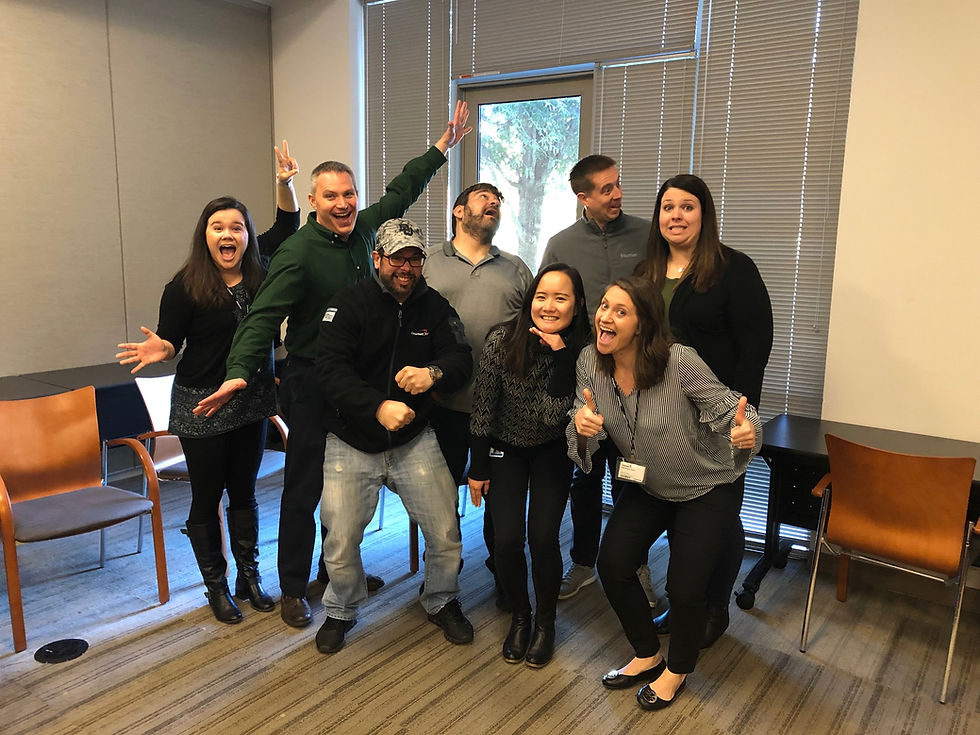The Power of Play IN THE WORKPLACE
- Alexandra Horn
- Oct 29, 2019
- 3 min read
What if “play” at work actually enhances the productivity of your staff?
That was the question recently asked by Nancy Painter for an article she was putting together for People Talk magazine, a leading publication in the HR sector.
What role does “play” have in creating a workplace environment that employees love being a part of?

Team Building , specifically creating stronger teams that work together more efficiently, that collaborate at a higher level and actively support each other is a significant benefit for companies that embrace the idea of play, and within that, embrace the improv mindset as part of their culture.
As Graeme Duffy, a corporate trainer from Vancouver TheatreSports, stated in the People Talk article, “There’s something to be said for the spirit of agreement and acceptance of ideas. People learn to say yes to each other. They’re open to ideas, gain greater creativity through an expanded mindset and improve problem-solving by doing things together, not in isolation.”
It doesn’t have to be a “Yes, and…” environment exclusively and in fact shouldn’t be. There is a place for “Yes, but…”, although it is almost always later in the ideation or problem-solving process. Leaving the “Yes, but…” phase for later, when working through specific details and logistics, helps establish a foundation where colleagues trust each other, knowing their ideas and contributions will be accepted and built upon. And they, in-turn, will support their fellow teammates in the same way.
Can we accomplish more with an approach that is joyful, open, more spontaneous, and fun? The answer is almost always yes.
Studies show that infusing a culture with an attitude of “play” (and there are as many definitions of “play” as there are people in the workplace), positively affects return on investment for organizations.
The overall idea of being playful, and creating opportunities for playfulness amongst colleagues impacts the bottom line.
There are notable advantages, ranging from unifying teams, to greater creativity (which leads to more innovation), a reduction in turnover through burnout, a more agile team that can manage the unexpected, and an overall happier workplace.
Strong management understands the importance of play to their culture and people. Michelle Reid, the HR manager at HyperHippo Productions, a video game and software development company, says “play is a best practice. If HR supports play and links it to strategy, it’s easier to get buy-in from leadership. We’re seeing a sea-change in attitude to various things related to play in the workplace, including the benefits for mental health”.
If the culture of an organization makes it one where people want to be, where they feel supported and valued, that’s an organization that will thrive.
Play at Work We work with organizations throughout the Dallas-Fort Worth region in the area of creating a culture of collaboration, support, creativity, innovation and joyfulness.
Whether through one of our custom designed team building sessions, or one of our other corporate workshops, we can create a session that focuses on your vision and goals in the area of culture and play.
To learn more about how we can infuse play into your workplace, connect with either of us to discuss: Alex at Alex@improvtoimprove.org or Kayce at Kayce@improvtoimprove.org
*****
To connect with Graeme Duffy, who’s quoted extensively in the People Talk article, and Vancouver TheatreSports’ Corporate Workshop division (corporate team building workshops in Vancouver) contact Jeff at development@vtsl.com.




Comments